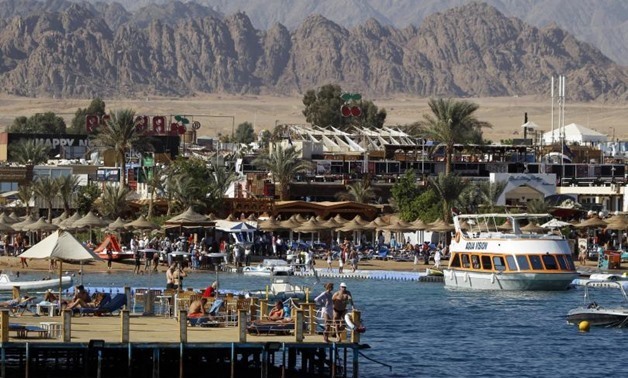
The Red Sea resort of Sharm El-Sheikh – Reuters
CAIRO - 13 September 2022: A recent study published by the Egyptian Center for Thought and Studies stated that the blue economy contributes greatly to the Egyptian economy.
The study highlights that Egypt has about four thousand km of beaches on the Red Sea, the Mediterranean, the Suez Canal, the Nile River and a number of lakes, and these water views enable the establishment of more economic activities related to the blue economy, in terms of fishing and fish farming activity.
The necessary ingredients for the development of fisheries are available in Egypt from the abundance of land, water and human cadres, in addition to the expansion of the fish fodder industry, and attracting private investments to this sector. The private sector contributes about 99% of the fish sector production and 90% of fish feed production in 2019.
The study prepared by the researcher Asmaa Refaat added that the 2030 sustainable agricultural development strategy is to restructure the basket of animal protein from the least expensive local sources, and to increase the per capita share of animal protein by about 4.4 grams / day by 2030, through increasing the consumption of protein by about 1.8 grams of them 1.7 grams of fish. This trend is very important in light of the multiplicity of international crises affecting the movement of global trade, and the high prices of imported goods, and its reflection on the Egyptian economy.
According to the study, the World Bank defines the blue economy as “the sustainable use of ocean resources for economic growth, improving livelihoods and jobs while maintaining the health of ocean ecosystems, particularly as it affects human activities such as fisheries, transportation, renewable energy, waste management, climate change and tourism.” , which would otherwise be food poor if they had not had a large fleet of fishing vessels.
The study indicated that Egypt owns about 53 seaports, including 15 commercial ports and 38 specialized ports. The volume of imports and exports to Egyptian port authorities during 2021 is estimated at 162.8 million tons, through 11.59 thousand ships.
According to the study, the country seeks to make Egypt a global center for trade and logistics by increasing the number of ports and transforming them into logistic areas to carry out loading, unloading, packaging, re-exporting, manufacturing, maintenance and financing ships and heavy and light marine industries, as well as linking seaports with dry ports and logistic centers. The development of ports also mechanized logistics services, which resulted in reducing the customs release time to 50%, and the cost of the port development plan is estimated to about 115.6 billion pounds.
The study stated that there is great importance for the blue economy for the continent of Africa, and the Africa Agenda 2063 included describing the blue economy as a window to achieve the African renaissance. The Egyptian view of the importance of demarcating maritime and water borders to avoid conflicts, enhance benefits, advance growth and achieve development.
Comments
Leave a Comment